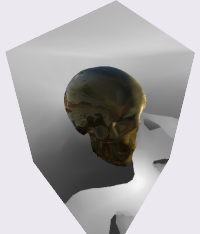About Muli3D - Features - Goals - Screenshots - License - Change log - |
 |
|
||
 |
|
 |
|
Information: Features Platform-independet - Currently Win32, Linux and AmigaOS 4 are supported. 16/32bit color-output - Uses DirectDraw on Win32 and the X11-library on Linux. Wireframe and solid fill rendering Sub-pixel accuracy  Vertex- and pixel shaders - Vertex shaders transform vertices to projection-space and set up registers for the pixel shader. Pixel shaders calculate a pixel's color and (optionally) its depth. Depth-correct interpolation of shader registers Support for triangle-lists, strips and fans Rendering of primitives through indexing into a vertex buffer 16-bit and 32-bit index buffer formats Multiple vertex data streams Three triangle-subdivision modes - Simply, smooth (simplified implementation of ATI's TruForm) and adaptive (base for displacement-mapping). Homogenous clipping Backface culling Scissor-testing Z-buffering Floating point textures depth- and framebuffers - Muli3D supports floating point textures, which can serve as input for shaders or output as depth- or framebuffer. Standard 2d textures, cubemaps and volume textures Mipmapping Point-sampling, bilinear and trilinear filtering supported Wrap and clamp texture addressing modes Texture sampling in vertex- and pixelshaders No internal limits on texture dimensions - supported formats are single float up to four floats. Rendering to cubemap faces - they can be treated as standard 2d textures and therefore may be used as frame- or depthbuffers. Rendertargets are directly presented - no rendering to a backbuffer is necessary! Comprehensive math-library - with support for vectors, planes, quaternions and matrices. |